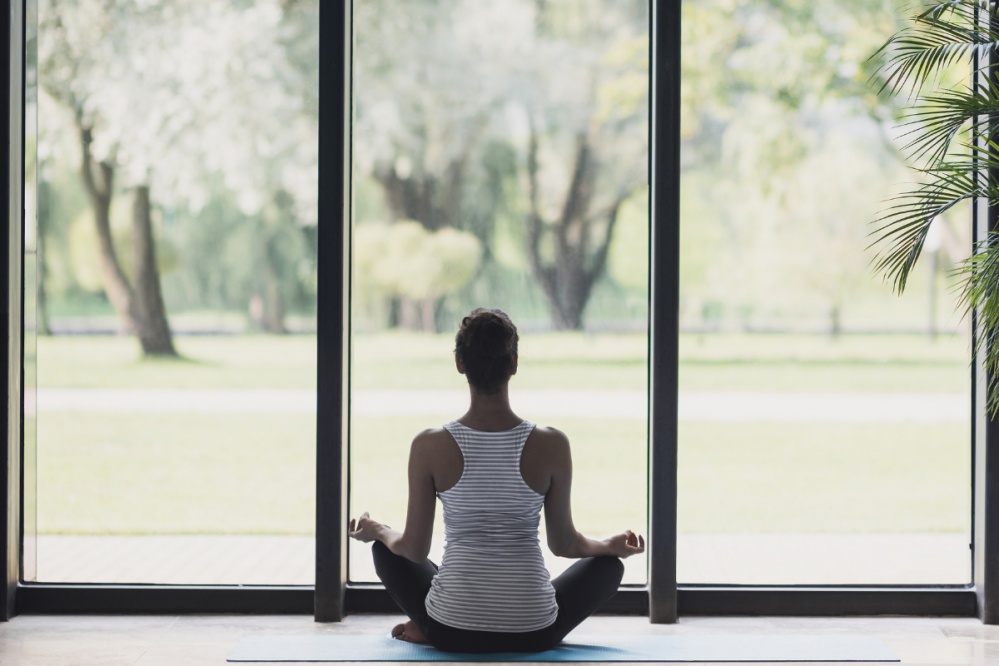The Lesser-Known Benefits of Yoga on World Yoga Day

This World Yoga Day we're highlighting the benefits of this calming practice
Improves Posture
Your head is heavy. Balanced on top of your spine, it is far less work to keep your head upright if your head and back are aligned. A few centimetres forward, or back, and you start to strain neck and back muscles as they struggle to keep your head in the correct place, which in turn may cause long-term back problems. As you drop your head and slump, you compensate by flattening the natural curves in the neck and spine which leads to reduced movement. Regular yoga helps to improve posture. Plus, the taller you stand the slimmer you look!
Strengthens and Lengthens
Strong, long muscles mean a healthier body, better movement and better balance. Strong muscles also look good. Many yoga postures require you to lift part of your body weight, and weight-bearing exercise is known to help ward off osteoporosis – poses such as Downward and Upward Dog and the Crane will quickly help to strengthen the arms.
Improves Blood Flow
Yoga’s twisting poses, such as Half Lord of the Fishes, are believed to help extricate venous blood from internal organs, allowing oxygenated blood to flow in once a normal posture is resumed. Inverted postures encourage blood from the legs and pelvic area to flow back towards the heart where it can be pumped to the lungs to be re-oxygenated. By improving blood flow yoga also improves circulation, especially to the hands and feet.
Helps Boost Immunity
By contracting and stretching muscles and maintaining postures you stimulate lymph drainage which in turn helps your lymphatic system fight infection and get rid of toxins.
Improves Breathing
Most of us don’t breathe properly. Breathing correctly has huge benefits, including better mental performance, and yet it is something we tend to overlook. As the foundation of all yoga practice, conscious breathing is cleansing and calming, allowing the body to absorb more oxygen and eliminate more carbon dioxide. Research shows that conscious breathing activates a different part of the brain, stimulating the cerebral cortex into sending impulses to the connecting areas that have a relaxing and balancing effect on emotions.
Helps with Digestive System and Beats Bloating
By helping to reduce stress levels, which are the underlying cause of so many health issues, yoga can help with ulcers, IBS and other digestive problems. As with all physical exercise, digestion is improved so the body can transport waste more efficiently through the bowels, helping to ease constipation, and by stretching out and improving circulation you can release the build-up of gas which causes bloating.
Helps Combat Stress
Yoga lowers cortisol levels which are heightened by stress. Continually high cortisol levels can compromise your immune system, and also interfere with weight loss. Excessive cortisol has been linked to depression, osteoporosis, high blood pressure and insulin resistance. It is also known to lead to you eating extra ‘comfort’ calories which are then deposited as fat, usually around the abdomen, contributing to weight gain.
Helps You Stay Focused
Studies show that regular yoga sessions improve coordination, memory and reaction times, and by encouraging you to relax and slow your breathing can help day-to-day functioning, and sleeping patterns – all of which help with mental activity. Restorative yoga which provides downtime for the nervous system means you’ll be less tired and stressed, and can stay focused and functioning for longer.
Increases Self-Esteem
Many of us suffer from low self-esteem, which if handled negatively may lead to poorer health physically, mentally, and spiritually. If you take a positive approach to yoga and practice regularly with the intention of self-improvement – not just using it as an alternative style of exercise – you will access a different side of yourself. The more aware you are, the easier it is to break free of destructive emotions. By feeling better about yourself, you’ll soon feel the positive impact on many aspects of day-to-day life.










